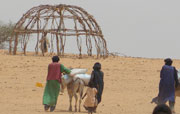
The crisis in the Sahel will not end unless new responses depart from the traditional “business-as-usual” approach. This was the key insight offered in a high-level roundtable held at IPI on September 7, 2011 and attended by ambassadors from Mali, Niger, Chad, Benin, Morocco, and Turkey, along with representatives from civil society organizations, academics, and experts from think tanks and research institutions, including the Mauritania-based Centre for Strategies and Security for the Sahel-Sahara Region. There were 55 participants in total.
Six key points emerged from the meeting:
1. In Mali, the epicenter of a wider and deeper crisis in the Sahel, the economic nature of the armed groups in the north is increasingly visible. Initially considered as a response to the corrupt administration of former President Amadou Toumani Touré, the emergence of Islamists serves as cover for illicit trafficking of drugs, cigarettes, and migrants, thus facilitating the transfer of a considerable amount of foreign currency. Beyond Mali and the wider Sahel-Sahara region, trafficking is becoming a serious threat from the Atlantic Ocean to the Red Sea, contributing to the weakening of states and fueling political instability. To address these criminal aspects of the crisis in northern Mali and across the Sahel, a strict security approach should be complemented by principles of governance and the rule of law. Moreover, regional initiatives such as the West African Coast Initiative (WACI), which aims to fight drug trafficking by enhancing national and international coordination and by enabling investigations, should receive greater attention and support from countries in the region, as well as from the international community.
2. The prospects for a negotiated settlement in Mali are presently unlikely. In Bamako, the current government institutions are too weak and the political elite and the security apparatus are too divided to be effective negotiating partners. They cannot put pressure on the rebels nor convincingly provide incentives to inspire the will to negotiate. In the north, the Islamist groups, including Ansar Dine and the Movement for Oneness and Jihad in West Africa (MOJWA), represent a set of tactical alliances, rather than a cohesive opposition. Each group seems to be jockeying for territorial control in order to get a seat at the table when negotiations do come. As time is of the essence, suggestion was made for an alternative negotiation framework that could take over from the Economic Community of West African States (ECOWAS) mediation process. Beyond the Malian actors and sub-regional leaders, such a new framework would involve key players including Algeria, as well as other countries outside the region that are ready to help find a solution to the crisis.
3. The difficult prospects for negotiation make military escalation increasingly probable. At the sub-regional level, ECOWAS has proposed the establishment of a 3,300 strong West African force conditioned on authorization by the Security Council. While the European Union and France specifically seem open to the possibility of providing military support as a last resort, Bamako has given every indication that the need is for equipment rather than troops. As always, however, as military escalation plays out, it is fraught with risks. Many of the groups operating in northern Mali have a tenuous tactical alliance that patches over generational tribal tensions. Likewise, there is historic friction between sedentary and pastoral communities. Any military action runs the risk of inflaming these intercommunal tensions to open fighting.
4. Beyond the negotiation process and possible military intervention, long-term reforms in Mali are necessary to address the legitimate grievances of the Tuareg and other populations in the north, and to restructure a national army weakened by divisions, poor morale and lack of training and equipment. The establishment of a strong, effective and legitimate government in Bamako, and resolving tensions within the Malian army are requirements for such reforms. In addition, establishing a functioning decentralization system, and setting up regional platforms for mutual capacity building are possible strategies to strengthen weak local structures in Mali and across the Sahel region.
5. The acute security crisis in Mali is eclipsing the longer-term humanitarian, developmental and demographic time bomb in the region. Already in good years, 250,000 children die of severe acute malnutrition. During this year’s drought, the third since 2005, more than a million are at risk. The population of Niger alone is set to double in the next four decades. This population growth and diminishing agricultural productivity threatens to create a prolonged humanitarian disaster of massive proportions. Thus, the various components that make up the “resilience” agenda will be critical to meeting this challenge and staving off disaster. Advancing this agenda requires countries in the region and the international community to show greater support, specifically by mobilizing adequate funding and other necessary resources.
6. Finally, the perennial challenge of coordination of national, international, regional, and sub-regional activities needs to be addressed. The interagency cooperation afforded by the resilience agenda is a helpful coordinating mechanism and progress can be seen in the appointment of a regional coordinator for the Sahel by the UN Office for the Coordination of Humanitarian Affairs. Likewise, the “field-led” integrated strategy to be presented on September 17 to the Security Council will be an important step in that direction. It is important to note that the appropriate role of the UN is not to act on its own, but rather to reinforce local and national capacities. Thus, the call for a stronger UN involvement–with the expected appointment of a UN special envoy for the Sahel–should be balanced by regional ownership of the proposed integrated strategy and, beyond the involvement of regional and sub-regional organizations whose membership often overlaps, the provision of platforms encouraging dialogue among populations across the Sahel region.
(This text was first published in IPI’s meeting brief.)
Chris Perry is a Senior Policy Analyst at the International Peace Institute.
Mireille Affa’a-Mindzie is a Research Fellow at the International Peace Institute.
About the photo: Mail refugees in Niger, June 2012. Photo by Nicolas Moyer/The Humanitarian Coalition




